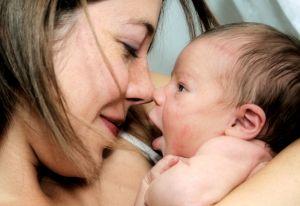Many new mothers are anxious to begin losing the weight they gained during pregnancy after they have given birth. The nutritional needs of a new mother during the postpartum period are just as important as they are during pregnancy. Pregnancy can rob a woman’s body of iron and other vital nutrients. Eating a healthy diet after pregnancy can help restore nutrients and give a new mother extra energy during the sleep-deprived early weeks of new motherhood.
Restoring Iron Reserves
Many new mothers suffer from anemia, or low iron levels, as a result of blood loss during delivery, especially after a C-section, and as a result of the extra iron needs of the growing baby before birth. Eating iron-rich foods such as meat, spinach, eggs, and iron-rich cereals can help restore iron reserves and provide natural energy. Iron supplements may be prescribed, but they must be taken with foods rich in vitamin C to help with absorption and may cause constipation.
Dealing with Constipation After Pregnancy
Constipation can be a major problem in the postpartum period, especially if a new mother is taking an iron supplement to treat anemia. This can be an extremely painful condition for mothers who have had any tearing or an episiotomy. Constipation can be treated by taking a mild stool softener, drinking plenty of water, and eating foods high in fiber. Food-based fiber sources include, whole grains, fruits, and vegetables.
Caloric Needs of New Mothers
Many new mothers are anxious to lose the weight that they gained during pregnancy, but it is important to consider the caloric needs after pregnancy. A mother who is not nursing her baby will have the same caloric needs that she did before pregnancy. Breastfeeding mothers will actually need more calories than they did during pregnancy. In order to make enough milk for her baby, a new mother will need to eat between 200-500 extra calories a day.
Foods to Increase Energy
New mothers often struggle from the effects of sleep deprivation as they adjust to life with a newborn. While taking naps during the day is a good way to deal with sleep deprivation, many new mothers find it difficult to fall asleep during the day. Getting high-quality nutrition can help counteract the effects of sleep deprivation by providing a new mother with natural energy. Avoid caffeine and sugar. They will provide a quick burst of energy but will actually leave a new mother feeling more tired after the initial burst of energy has faded and can cause problems falling asleep. Eat frequent small meals filled with protein-rich and fiber-rich foods such as cheese, whole grains, lean protein, fruits, and vegetables. Overeating or undereating can exaggerate feelings of sleepiness and should be avoided.
Foods to Encourage Weight Loss
Eating a well balanced diet filled with whole grains, fruits, and vegetables can help a new mother to get the nutrition that she needs while encouraging postpartum weight loss. It is tempting during the early months of new motherhood to resort to fast food or prepackaged convenience foods but these are filled with extra calories and fat. Create simple meals consisting of a piece of broiled lean protein such as chicken or fish, a healthy serving of fresh vegetables, and a whole grain such as brown rice or couscous. After a new mother has recovered from childbirth, some basic exercise, such as walking, combined with a healthy diet, will help the weight from pregnancy disappear.





